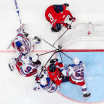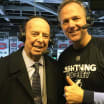NHL.com's Q&A feature called "Five Questions With …" runs every Tuesday. We talk to key figures in the game and ask them questions to gain insight into their lives, careers and the latest news.
The latest edition features Pittsburgh Penguins defenseman Kris Letang:
Five Questions with Kris Letang
Penguins defenseman says team utilizing its speed to find success

NEW YORK -- Pittsburgh Penguins defenseman Kris Letang was reminded what he was sitting on, and he couldn't help himself. Superstition calls sometimes.
There he was sitting on a wooden bench in the visitors' dressing room in Madison Square Garden following the Penguins' 3-2 overtime win against the New York Rangers on Sunday. Letang was asked about staying healthy, and how now, finally, he is actually healthy.
So, naturally, he loosely clenched a fist with his left hand, knuckles slightly out, and knocked on wood.
"I'm pretty good now," Letang said, smiling.
How modest. Letang has been way better than pretty good since he missed nine of 11 games from Dec. 5-27.
He has 14 goals and 42 points in 39 games since Dec. 30. The Penguins are 24-10-5 in those games. Letang has played 25 or more minutes in 35 of the past 39 games, including 30 or more minutes in three of the past seven.
While his impressive play in the past 39 games coincides with his health, Letang said it has a lot to do with the coaching change from Mike Johnston to Mike Sullivan. The Penguins made the switch on Dec. 12, when Letang was injured.
"When we had the coaching change I just saw it as a way to show what I'm capable of, trying to forget the early start," Letang said. "Me and [Sidney Crosby], obviously we didn't do what we needed to do at the start, and for me it was just a way to show what I'm capable of to a new coach in power play, PK and in more situations. It went pretty well. When I play a fast game, that's right up my alley."
Letang also spoke in depth about the differences in the Penguins since Sullivan took over (they're 27-15-5 after going 15-10-3 under former coach Mike Johnston) as well as what's clicking now that has helped them go 8-1-0 in their past nine games.
Here are Five Questions with … Kris Letang:
Can you give a rundown of or describe the differences between playing under Mike Sullivan and playing under Mike Johnston?
"It's more black and white. Before there were too many indecisions. Sometimes you'd play a game and I would say the three forwards, one guy would decide we're doing a long regroup and the other two guys wanted to go fast, so everybody wasn't on the same page. With [Sullivan], he wants us using our assets, like speed. He wants the puck going north-south. He wants to make sure that we don't bring the puck back and try to skill our way through. He wants us to put it deep and use that speed. You look at Chicago, they slow their game down. Patrick Kane comes back and he's got so much skill so he can skill his way through. That's not our type of game. Our game is based more on speed. It's black and white. You know what the other guy is going to do and you know what to do for him. Easy."
So with that, are the results in the past nine games because the team is used to playing with that style now, or has the team been playing significantly different or better than it was prior to this nine-game stretch to get those results?
"I think we understand more how to win with the personnel that we have. We have a great mix of veteran players, skilled players and young guys that bring a lot of energy and a lot of grit. I think we found the recipe for how to win the games. It's not by making fancy plays like we used to do with all the skill. It's playing behind the D and using our biggest strength, which is speed."
Speaking of speed, if you're a defenseman playing against the Penguins, who now deploy Phil Kessel and Carl Hagelin on the same line, playing on opposite wings, is there a way to defend them to counter their speed? What would it be like to deal with that and, more importantly for you, what is it like for your team now to have that?
"It's pretty hard. It's hard to play against guys that will play behind you, especially with that speed. When [Hagelin] and Phil don't try to make plays through the line and don't try to dangle people, that's when they're most effective. When they put the puck behind and a defenseman has to turn, it stinks for that defenseman. You have your back turned to the play. You don't know your options. You know there is speed coming. So even if you touch the puck and get it first, you know these guys are going to be right on you. Once they're down there they are pretty dangerous because they wheel it around, gain speed and it's hard to defend."
You may be healthy, but your team doesn't have Evgeni Malkin or Olli Maatta now and Brian Dumoulin has been out too. It's like same ol' same ol' with this team. You're constantly dealing with injuries to significant players. Do you look around and ask yourself, 'What if?'
"Yeah, I know. When you think about it, what if we had [Malkin] on our power play? We would be really dangerous because that's a few more goals that we had to our game. Maybe the game [against the Rangers] isn't 2-2 going into overtime; maybe it's 3-1 or 3-2 before overtime. The game can change at the end of the third or in overtime we might have ended the game quicker [with our power-play chance]. But overall I think because we don't have [Malkin] we have simplified things and we go faster. You play with your strength. [Malkin] is not out there so you know you don't have the poise and the shot and everything that he brings, so you try to play with your own strength."
Did you feel this coming for this team, the success you've had in the past nine games, going 8-1-0? Is this a market correction for what has always been a good team?
"I was waiting for it at the beginning of the year, but you know what? Every year, teams have starts that don't matter. Look at L.A; sometimes they have bad starts, but they finish the year well and go win the Stanley Cup. For us, it's always a question of time before Sid starts scoring, [Malkin] gets going, and it makes everybody better around them. I think overall we know with the quality of players we have we're going to be successful at one point as long as we really stick to our game plan."

















